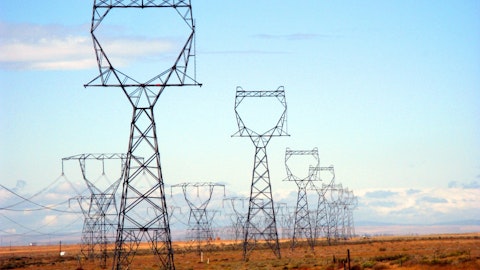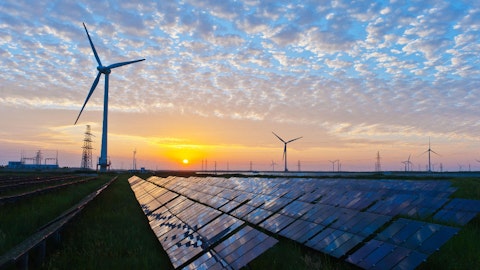We just disagree strongly from a legal point of view with that decision. And I think in the same way in New York, I think you hear comments by the commissioners about compliance with law in the case of termination of PPAs in offshore, you will remind people that companies need to be paid for the investments. I think we want to make sure that’s the case in any jurisdiction where we do business. So I think in the case of Connecticut, there has been a good decision in the run, in a rate of just mechanism after the rate case. I think we are working very hard in the appeal. We think we’re going to take further action soon. We’re going to continue. I think we’re finding some rate cases right now. I would love to say that we have learned because of the prior decision how to file a rate case differently.
But the problem is if you have read the decision, you say, well, you did improve this, but you also [indiscernible] you have proven it. okay? That’s why we strongly disagree with the decision that was taken. So the only thing we can do is work hard in the relationships where we put a lot of information on the table. And also, unfortunately, to follow the complaint angle in any manner we can think of. And I think when you do those things and you have done nothing wrongly and perhaps the decision is not correct. I think we just expect this to turn around in the future. Is there something we expect in the near future? I think we’re working every single day. We do not stop. We continue to do many meetings. We continue to see additional legal actions.
We continue to have employee actions, suppliers actions, management actions. The good thing about this decision is to prove how close we are, how proud we are of being part of the Avangrid Iberdrola family. We are a company. There’s no differentiation between management and employees. There is no differentiation between union workers and nonunion workers. I think when you have a decision like this, will affect everybody. And that’s why we are strongly reactive to all of us. I think it’s the same thing with governing control power. It’s something that a lot of employees have reacted on their own against that approach. So I think we’re very proud of the reaction all of us have taken. But again, what we can do now is work, do as many actions as we can.
And I think in the same way that last year, I think we told you you’re asking us if we are going to get a 2% rate increase in New York or 0% rate increase in New York because of a comment by a governor or one comment by somebody else. I think we told you, let us work, okay? And I think right now, you’re seeing the rate cases. You’ve seen this one. Again, this is very small. Keep in mind that $50 million less investment in Connecticut is compensated by $3 billion in New York that we have in the plan. So you multiply by pick up any number you want. So the whole [indiscernible] are affected. But we simply do not accept having decisions where we believe are illegal, change of practice without notice, change of precedent. That’s not the way to have — to do business and invest in our sector.
So from that point of view, I think we need to continue working. This is not personal matter. These are just objective matters that we need to deal with and give us some time to continue working.
Sophie Karp: Terrific. Thank you. And my other question was kind of like a big picture question on offshore wind. You guys probably are the closest utility in the U.S. to the space and have the most expertise. So from where you sit, right, and from what about the cost of equipment, cost of capital, tax equity availability, et cetera, like the PPAs that you have been canceled, right? Can they be rebid in a way that’s both economic given the current environment and also palatable for the rate payers in those states? I guess it’s kind of like a question. Is the LCOE of offshore wind acceptable right now, I guess, for policymakers for other stakeholders as the things stand, like I’m just curious to hear your thoughts?
Pedro Blazquez: I think in our case, to say offshore business, there are a lot of risk going on in Europe. They are a good project we are building here in the U.S. at present. So I don’t — we don’t like the stereotypes or generic comments, because it’s not true. I think you need to go case by case. I think in our case, the message last year was simple. And this is how we have done business in Iberdrola for 25 years. We’re not going to put in danger of the financial health of the company. That’s it. And I think we said that a year ago. I think some people say that we have done a bad bid. Other people said that we didn’t have any negotiation here, we didn’t do this. It doesn’t matter to us, what other people do. I think in our case, we were clear, we will not start a project if we already have information and we got — as soon as we got it a week after we got information, we sat down with the leadership in those states, we kind of go ahead with the project that you already know you’re going to have $1.6 billion write-off and $1.2 billion, because the contractors are renegotiating, they’re opening the contracts and you cannot reopen the PPA so it doesn’t work.
So that’s why for us, the answer is you have to — not a stop. I think a lot of people refer to stop this, do not to start. And that’s what we did. We simply did not start. I think right now, you have a couple of leases that are very valuable, I think, if you see the new options, are we going to participate? Let’s see. I think unless you have indexation unless you have, we will not be able to have any risk. The important thing for us is we will not run risks. I think that’s the message. Other people, we don’t know. You need to check with everybody where they are. In our case, we don’t have billions of losses right now. I think we have a very modest loss because of losing those guarantees. By the way, sometimes in renewables, you have those losses quite often in some projects that are compensating with other gains in other projects because you beat the budget.
I think in this case, we have two beautiful leases. They are worth a lot right now. And I think we are in the right space. I would encourage all of you to keep in mind, the President, Governor Hochul, Governor Healey, Governor Lamont, I think they’re leading right now, the U.S. in terms of renewable, green transition, climate change, et cetera, and we are as well. We are building a transmission line from Canada into Massachusetts, and we are building the only project in larger scale right now in offshore. And will this continue? Well, sometimes things to stop for a year, sometimes it stop for five years, for three years. But in our case, what we’re going to do at all is to put in risk billions of dollars coming from our shareholders and lenders basically get not only Avangrid, but the whole with rolling to danger, that’s now how we do business.
So I think in our case, we will go case by case.
Operator: We go next now to Julien Dumoulin-Smith at Bank of America.
Julien Dumoulin-Smith: Can you hear me?
Patricia Cosgel: Yes.
Julien Dumoulin-Smith: Hey, excellent. Thank you. And congrats to both of you here on your successive moves here. So maybe actually starting with that, if you can, a little bit further. Can you just speak a little bit to the commentary in the 8-K the other day around the backdrop with the new committee here and just sort of the context of what drove that decision here, if you don’t mind? It’s certainly an intriguing release here, what precipitated it? And can you confirm that this was related at all to the latest decisions to see, obviously, the turnover in the CFO role, if you can affirm that as well?
Pedro Blazquez: Okay. As long as that’s your concern, I’m very happy, Julien. So I’m more than happy to speak about that. First, I will speak on the compliance and then Patricia, you can answer if that has anything to do with you retiring. I think on the compliance, we never stopped improving and enhancing our compliance unit. I think we believe there has been probably six months to nine months analysis of further improvement of the compliance. Basically, we’re moving from just one compliance unit of the Avangrid level to put in compliance units in each of the businesses. So we are multiplying by three the focus right now in terms of how we’re going to do compliance in the group. So I think what we’re doing is going to beyond.
If somebody wants to say that this is related to three, four years ago that we had a tax issuing the accounts. Well, maybe let’s go back to ’22 to 2002, maybe we also had something wrong there. This is something that we never stop at the group level, at the Avangrid level and at each subsidiary. We think we need to continue enhancing the compliance. A lot of people right now may say, well, because of Ukraine war and other dynamics, it’s not ESG so important right now for us, it is. We’re not going to stop and one of the key things is to enhance compliance across the organization. And that’s why we know — there is not like a perfect time to announce this. This is not a matter of when. This is when we have finished the analysis, and we believe there is an improvement.



